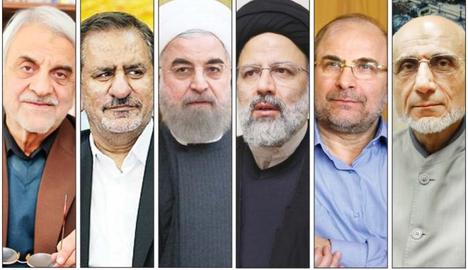In the run-up to the election, Iran’s hardliner and conservative media have been busy trying to push one headline: On May 19, President Hassan Rouhani will be faced with a runoff competition instead of the outright victory he and his supporters had hoped for and expected.
On May 1, Ezzatolah Zarghami, once a Revolutionary Guards general and the former Director-General of Iran’s state-run radio and television, confidently advised his successor to prepare for “three face-to-face” debates in a second round of the campaign.
In the 2013 presidential election, Hassan Rouhani won by 51.6 percent. So why are his rivals so confident that a second round is so likely?
1. The Economy
Iran’s principlists claim Rouhani has lost votes because of his government’s poor performance with the economy. It has failed to revive it, they argue, and this has led to recession and an increase in unemployment.
2. The Polls
Some recent surveys show that, at this moment in time, Rouhani has the support of less than 50 percent of Iran’s electorate. According to the Iranian Students Polling Agency (ISPA), 43.5 percent of likely voters will vote for Rouhani in the first round. The website Alef, managed by the former member of parliament Ahmad Tavakoli, has published a series of polls that puts Rouhani’s voters anywhere between 36 to 42 percent.
3. Debate Performance
Most analysts and commentators agree that Rouhani performed below expectation in the first presidential debate; his performance was weaker than usual. Throughout the debate, he generally confined himself to defending the current conditions in Iran today. He failed to provide strong ripostes to sharp attacks from Mohammad Bagher Ghalibaf, his rival and the current mayor of Tehran. His weak performance has led some to speculate that it could cost him at the polls.
4. Fewer Principlist Candidates
In the 2013 presidential election, four principlist or conservative candidates were in the running; they split 16.4 million votes between them. They wasted a considerable amount of time fighting among themselves and, as a result, failed to send a cohesive message to the people. Now they have only two candidates — Ghalibaf and Ebrahim Raeesi — which means less infighting. And both of these candidates share the same goal: Forcing Rouhani to fight a second round. There is little indication that more people plan to vote for the principlists, or that the differences within the conservative faction are any less severe, but the goal of forcing a runoff certainly seems more attainable this time.
5. Sluggish Campaign
Up to now, Rouhani’s campaign has not been very energetic. He has not actively engaged with potential supporters. To be sure, his supporters have been active and often effective, particularly online and across social networks. But most of them act independently from his campaign headquarters. Furthermore, his campaign not only started late, but it has been both sluggish and unfocused. This may well prevent a groundswell for Rouhani among voters.
All said, however, Rouhani still has enough time to rebuild his image and come across as a persuasive candidate. Elections in Iran are decidedly more about individuals than about parties and political organizations. There are still two presidential debates to go, and Rouhani can use them as opportunities to proclaim the achievements of his administration and to convince voters that he is the right candidate. The same happened in 2013: Rouhani had a very weak start, but with the support of the reformists and his own shining performance in subsequent events, he was able to change the game to his own benefit. Plus, this time around, he has his first vice president, Eshagh Jahangiri, also a candidate, who succeeded brilliantly in waging a psychological battle against Mayor Ghalibaf in the first debate.
What is more, a number of important principlist figures, including parliament Speaker Ali Larijani and the former speaker, Ali Akbar Nateq-Nouri, have indicated their strong support for Rouhani. This support could sow confusion among Rouhani’s opponents who, in any case, are quite vulnerable as it is.
In fact, it seems that a second round is the most that the principlists can hope for. No surveys have indicated that the principlist candidates will be able to secure more than 40 percent of the vote in total. The days when they had pinned their hopes on a strong showing from Ebrahim Raeesi are gone. Now their only hope is to force a runoff — and that is how they are now re-focusing their efforts. If this happens, it would be the first time in the history of the Islamic Republic that a sitting president has been forced into a second round. For the principlists of Iran, this is no small achievement.
visit the accountability section
In this section of Iran Wire, you can contact the officials and launch your campaign for various problems

























comments